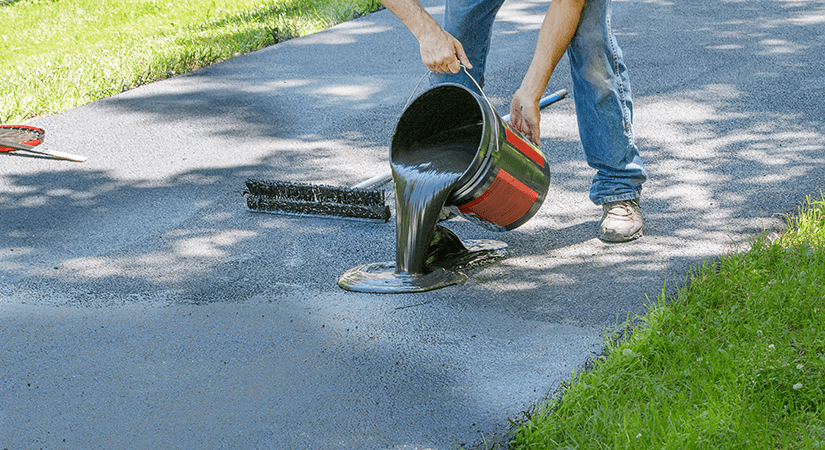Raise Sidewalk Performance: Cold Mix Asphalt Sealing Techniques
Cold Mix Asphalt Vs. Hot Mix Asphalt: Which Is Right for You?

Structure Differences
Cold mix and hot mix asphalts differ dramatically in their composition, with unique features that impact their efficiency and applications. Cold mix asphalt is created by emulsifying the asphalt binder with water and an emulsifying representative prior to blending it with aggregate. This technique permits the asphalt to be workable at lower temperatures, making it optimal for short-lived repairs and for use in chillier climate condition. Hot mix asphalt, on the other hand, is made at heats, normally in between 300-350 ° F, which helps to achieve far better compaction and a more resilient end product. The hot mix asphalt production procedure entails heating the accumulation and asphalt binder separately prior to combining them at the asphalt plant.
In addition, cool mix asphalt often tends to be much less thick and more adaptable than hot mix asphalt. This adaptability makes it better suited for areas with higher degrees of activity, such as driveways or roadways with heavy web traffic. On the other hand, warm mix asphalt is understood for its high resilience and resistance to rutting and breaking, making it a recommended choice for highways and high-traffic roadways where longevity is vital.
Setup Refine Variations
The process of setting up chilly mix and hot mix asphalt displays noteworthy differences in their needs and treatments. In comparison, hot mix asphalt necessitates a more fancy installment procedure. Due to the heating needs, hot mix asphalt installments are normally brought out by professionals with customized devices, making sure a much more structurally sound and long-term result.
Sturdiness and Durability Variables
When taking into consideration asphalt choices, resilience and longevity are vital elements to evaluate for long lasting sidewalk efficiency. Hot mix asphalt (HMA) is recognized for its remarkable longevity and long life.
In terms of durability, HMA generally outperforms CMA as a result of its premium strength and resistance residential properties. HMA pavements have a longer life span, requiring much less constant repairs and upkeep, which can equate to cost savings in the long run. Furthermore, HMA pavements are extra conveniently adjustable to satisfy details project requirements, better enhancing their longevity.
Price Considerations
Thinking about the financial ramifications is a vital facet when evaluating the choice between warm mix asphalt (HMA) and chilly mix asphalt (CMA) for pavement projects. While the preliminary price of warm mix asphalt is generally greater than that of chilly i was reading this mix asphalt, HMA typically offers a much more affordable solution in the long run due to its premium durability and long life.
In addition to product costs, it's essential to consider the costs linked with installment and maintenance when contrasting HMA and CMA. Ultimately, the choice in between HMA and CMA need to take right into account not simply the initial cost but likewise the long-term monetary implications to identify the most economical option for the details sidewalk task.
Environmental Effect Contrast
Comparison of the environmental impacts between warm mix asphalt (HMA) and cool mix asphalt (CMA) discloses distinct differences in sustainability methods. HMA manufacturing needs heats, causing raised power consumption and greenhouse gas exhausts. The procedure likewise releases unstable natural compounds (VOCs) and dangerous air contaminants (HAPs) right into the atmosphere. In comparison, CMA is created and used at reduced temperatures, decreasing energy use and discharges considerably. The reduced manufacturing temperatures of CMA lead to decreased fuel consumption and reduced levels of carbon dioxide emissions, making it a much more eco-friendly choice.
In addition, the usage of CMA typically involves reusing existing asphalt sidewalk, advertising source conservation and minimizing the quantity of waste sent out to garbage dumps. By choosing for CMA over HMA, roadway building and construction jobs can contribute positively to ecological conservation efforts.
Verdict
In conclusion, the selection between cold mix asphalt (CMA) and look at more info hot mix asphalt (HMA) depends on different factors such as structure, installment procedure, durability, longevity, cost, and environmental effect. asphalt patch repair. While CMA offers a fast and affordable service for small repairs, HMA makes certain exceptional durability and long life for heavy website traffic areas. Consider these factors carefully to identify which sort of asphalt is the best selection for your paving needs

Considering the economic implications is a vital element when reviewing the choice between hot mix asphalt (HMA) and cool mix asphalt (CMA) for sidewalk tasks. While the initial expense of warm mix asphalt is generally greater than that of cold mix asphalt, HMA typically supplies a more affordable service in the lengthy run due to its superior toughness and longevity. cold mix asphalt.Contrast of the environmental impacts between warm mix asphalt (HMA) and chilly mix asphalt (CMA) reveals distinct differences in these details sustainability techniques.In final thought, the selection in between chilly mix asphalt (CMA) and hot mix asphalt (HMA) depends on different factors such as make-up, installment procedure, durability, durability, cost, and environmental influence